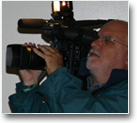
 |
  Award-Winning Professor Emeritus Co-Edits Fourth Volume on Mass Spectrometry Techniques with Trapped IonsFOR IMMEDIATE RELEASE Together with previous volumes, Dr. Raymond March’s new book provides compendium of knowledge on origin, theoretical treatments, and applications of trapped ion mass spectrometry over the past 15 years Monday, June 21, 2010, Peterborough Dr. Raymond March, professor emeritus in Chemistry at Trent University and an internationally-renowned and award-winning expert in his field, has co-edited with Dr. John Todd of the University of Kent in the UK, a new book on the latest research on mass spectrometry techniques with trapped ions. Practical Aspects of Trapped Ion Mass Spectrometry: Volume IV, Theory and Instrumentation, is the fourth book in a series detailing mass spectrometric instruments that employ one or more of several techniques for trapping gaseous ions. Mass spectrometry (MS) is a highly-specialized technique that permits the measurement of miniscule amounts of contaminants in other substances, such as food, water, and urine. This fourth volume, in a series of five books, features an international panel of authors presenting a world-wide view of the theoretical aspects of recent progress using trapped ion devices. It opens with ‘An Appreciation and Historical Survey of Mass Spectrometry’ that describes the development over the past hundred years of beam-type mass spectrometers, methods for ionization, detection methods, the origin of quadrupole instruments, and the emergence of new ion trapping instruments that have become commercially viable. “Volume IV gives perspective to some one hundred years of scientific endeavour in the field of mass spectrometry,” says Dr. March. “It highlights the nascence of each new ion trapping device, presents a coherent theory of operation for each new device, and unveils the present state of utilization of each type of device.” Dr. Raymond March, an internationally-recognized expert in mass spectrometry, has published more than 200 research manuscripts on the topic; in addition, he has authored/edited nine books. In August of 2009, he was presented with the prestigious Gerhard Herzberg Award by the Canadian Society for Analytical Sciences and Spectroscopy (CSASS) and, in 2008, he received an honorary doctorate from the Université Aix-Marseille. Since coming to Trent in 1965, Dr. March has developed new techniques in mass spectrometry that can be used by the pharmaceutical industry to develop new drugs as well as in the detection of steroids and other performance-enhancing drugs in athletes. Although he retired from the University eleven years ago, as a professor emeritus of Chemistry Dr. March continues to be active in research using mass spectrometry. His current projects include: partnering with the Ministry of Natural Resources to identify biomarkers in trees that have been infested by the damaging emerald ash borer beetle; working with Trent colleagues to investigate the reactivity of liver fatty acid binding protein with perfluorooctanoic acid (PFOA), that is used for rendering fabrics stain-free; and research into polyphenols (flavonoids and flavonoid glycosides) that occur widely in fruit and vegetables and are believed to be radical scavengers and have anticancer activities. -30- For more information, please contact: Dr. Raymond E. March, Professor Emeritus, Chemistry, Trent University, (705) 742-1597 (home) or rmarch1@cogeco.ca
|
































